Mon 26 Sep 2011
A Movie Review by Michael Shonk: WHO IS KILLING THE GREAT CHEFS OF EUROPE? (1978)
Posted by Steve under Mystery movies , Reviews[10] Comments
WHO IS KILLING THE GREAT CHEFS OF EUROPE? Lorimar (now Warner Brothers), 1978. Cast: Jacqueline Bisset as Natasha O’Brien, George Segal as Robby Ross, Robert Morley as Maximillian Vandeveer. Screenplay by Peter Stone, based on the novel Someone Is Killing the Great Chefs of Europe by Ivan and Nan Lyons. Director: Ted Kotcheff.
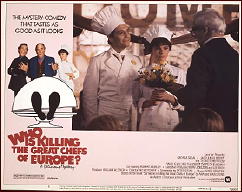
In Who Is Killing the Great Chefs of Europe? the world’s finest dessert chef Natasha O’Brien finds herself between a killer out to rid Europe of its greatest chefs and her ex-husband who wants her back.
Award-winning writer Peter Stone took the funny mystery by Ivan and Nat Lyons and gave it the style of Stone’s earlier romance suspense films such as Charade. Shot on location with some of Europe’s best actors, Who Is Killing the Great Chefs of Europe? remains an excellent example of the sophisticated adult romantic comedies that today exists only in our memories and DVDs.
The film begins with Maximillian Vandeveer, played to perfection by Robert Morley. Max is a food critic, publisher of a famous gourmet magazine and addicted to the best foods, and he is dying for those sins. Max is told he will die soon if he does not lose weight, but he responds he doesn’t want to live without his favorite meals.
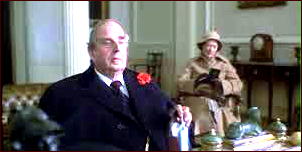
Max has arranged for two famous chefs to cook a dinner for the Queen. One of the chefs is Swiss Louie Kohler, the greatest chef in England, and the other is Natasha. Arriving in London, Natasha is kidnapped. She has no idea who or why anyone would kidnap her, but she is more annoyed by the delay than scared by the danger. The beautiful Jacqueline Bisset is delightful as Natasha, a confident pampered woman still hurting from her ex-husband’s affair and, more importantly, him letting the other woman use her kitchen.
Natasha’s ex and millionaire fast food king Robby Ross, played a little over the top by George Segal, has kidnapped Natasha to ask her to be the Master Chef for his new fast food omelette chain called H. Dumpty. She turns him down.
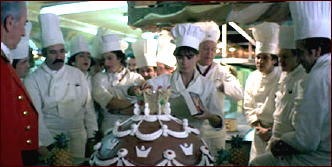
Kohler and Natasha prepare the meal for the Queen. The meal is a great success as is Louie’s attempt to seduce Natasha. In the morning she finds him dead, baked in an oven in the style of his famous baked pigeon dish. The police suspect Natasha until Robby blunders into the role of chief suspect.
Max sends Natasha to Venice to interview the greatest chef in Italy. There he explains, hands on, why Italian men pinch women, appropriately enough his specialty is lobster. Robby unexpectedly arrives. He is still searching for a famous chef to front H. Dumpty. Again, it is Natasha’s fate to find the murdered chef’s body, drowned in his lobster tank.
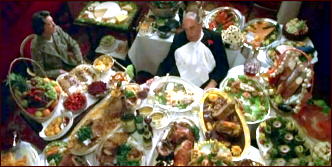
Robby realizes if the great chefs of England and Italy have been murdered, the greatest chef in France may be next. He contacts six of the greatest chefs in France, sets up a meeting, and invites Natasha to come with him. In a scene of blocking genius, when Robby and Natasha arrive the chefs are all sitting so each could not see any of the others. Each chef is convinced that only he could be the greatest chef of France. They all agree that a French chef should have been killed first.
As the tension and mystery intensifies, so does the romance between Robby and Natasha, much to the displeasure of Max.
With the death of the French chef, Natasha realizes how the victims were selected and that she is next on the menu. But when Max tells Natasha that the killer has confessed, all relax. Max sends Natasha to do a cooking show called “The Movable Feast”. On the show Natasha will show how to cook the dessert she made for the Queen, a bombe.
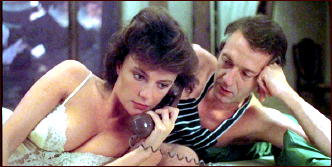
While the mystery would not challenge Ellery Queen, there are clues, suspects, and a killer that satisfies the detective in us. It is not only who the killer is, but who the next victim will be that maintains the story suspense.
What makes this film so special is its wonderful intelligent adult humor. Metaphors using food abound. The conflict between Robby and Max over Natasha, each loving and needing her in different ways, give a new twist to the romantic triangle. As any good comedy mystery, after the real killer confesses, there is a nice epilogue giving the characters closure. The final scene of Who Is Killing the Great Chefs of Europe? will leave you smiling and humming the delightful Henry Mancini’s theme music as the credits roll.
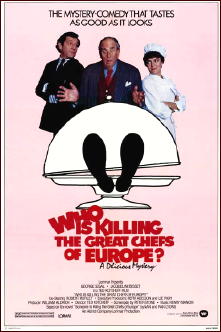
September 26th, 2011 at 8:41 pm
One of my favorite 70s movies. I always loved Morley.
September 27th, 2011 at 9:56 am
Morley does steal the movie. It is amazing he made such a character likable.
This is my favorite movie of all time. Certainly there are better films than this one, but there is something about one’s favorite film that is different from the films you put on your best film list. There is a magic to any good film, and when it comes to our favorites that magic somehow makes a more personal connection. A connection often beyond our own understanding.
September 27th, 2011 at 11:18 am
Michael
You did a good job with the review. I often find it difficult to write a decent review of books and movies I really like. I think you’re right. You can easily tell what it is that makes a book or movie go wrong, but it’s awfully hard to explain what it is that produces the magic when everything’s right.
Steve
September 27th, 2011 at 11:27 am
As a quick followup, but going in another direction, for some reason I find movies made in the 70s more interesting than any other era.
But as I was saying above, I’m not sure what it is about them that makes me feel that way. Perhaps it was the movie-makers had the equipment and techniques they needed, a lack of interference from the men above with the money, no computer produced effects, no “blockbuster or else” mentality, or maybe I was the right age to enjoy them then and still do now.
For any or all of these reasons, I’ll try to add more 70s movies to the mix you see on the blog.
September 27th, 2011 at 12:16 pm
Great flick. Morley played another gourmand who ended up being grotesquely murdered a la Shakepeare’s Titus Andronicus in the brilliant and macabre satire THEATRE OF BLOOD.
Aren’t the films of the 1970s considered a renaissance of great filmmaking? The independent film scene was still young, still alive with originality, issues were being explored in entertaining ways, great stories were being told. It was just before the film school grads exploded on the scene and ruined movies in the 1980s and early 1990s. Screenplays for crime movies especially became cookie cutter templates where everything was telegraphed or was obvious or was a “homage” to some cult movie of the past.
September 27th, 2011 at 3:18 pm
Robert Morley is one of my favourite actors, I still remember, when I saw him, as a kid in a movie, mostly on TV, I KNEW it was going to be GOOD !
He played smaller parts or supporting characters mostly, but made them BIG and memorable !
The Doc
September 27th, 2011 at 7:04 pm
My own favorite Robert Morley film is BEAT THE DEVIL. Paired up with Peter Lorre, he stole the movie away from the stars, even Bogart.
September 27th, 2011 at 8:22 pm
Morley fans will be surprised when they search Robert Morley over at YouTube. There is a nice interview, several movies such as GO TO THE BLAZES, MURDER AT THE GALLOP, CURTAIN UP and LAW & DISORDER, a clip from A STUDY IN TERROR (1965) where he played Mycroft Holmes, etc.
October 22nd, 2011 at 10:30 am
Was discussing this enjoyable movie with a friend last night. We were disappointed to realize that this is not available on DVD now. Is this really true? Please let me know if you know how I can obtain a copy.
Also – I read the book many years ago and was surprised to see that the murderer in the book and in the movie are not the same, as I recall.
Thanks,
George
October 22nd, 2011 at 1:42 pm
Good news, George.
GREAT CHEFS is available from Amazon or directly from Warner Archives:
http://www.wbshop.com/Whos-Killing-the-Great-Chefs-of-Europe/1000179732,default,pd.html?cgid=